

Kahn putting ethnographic writing. Definition of Ethnography by Merriam-Webster. Definition of Ethnography. The term ethnography has come to be equated with virtually any qualitative research project where the intent is to provide a detailed, in-depth description of everyday life and practice.
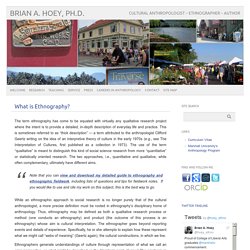
This is sometimes referred to as “thick description” — a term attributed to the anthropologist Clifford Geertz writing on the idea of an interpretive theory of culture in the early 1970s (e.g., see The Interpretation of Cultures, first published as a collection in 1973). The use of the term “qualitative” is meant to distinguish this kind of social science research from more “quantitative” or statistically oriented research.
The two approaches, i.e., quantitative and qualitative, while often complementary, ultimately have different aims. Ethnography § Q: Foundations of Qualitative Research in Education. Ethnography Ethnography is a research methodology that describes people and cultures through writing, and has disciplinary roots in anthropology.
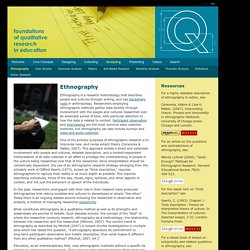
Researchers employing ethnographic methods gather data directly through involvement with the people and cultures researched over an extended period of time, with particular attention to how the data is related to context. Participant observation and interviewing are the most common data collection methods, but ethnography can also include surveys and video and audio collection. Ethnographic Research. Wilson TheoryEthnography. Classicalethnomethods. Ethnographic Research: A Key to Strategy.
Executive Summary Reprint: F0903C Unlike traditional market researchers, who use highly targeted questions to extract information from customers, corporate ethnographers observe and listen in a nondirected way.

Their method may appear inefficient, but it can yield rich data about product use. Corporate ethnography isn’t just for innovation anymore. It’s central to gaining a full understanding of your customers and the business itself. Ethnography is the branch of anthropology that involves trying to understand how people live their lives. Ethnography at Intel initially focused on new markets. Recently, Intel ethnographers have veered into strategic questions. Intel can analyze the latest buying patterns and customer surveys for useful data. High-tech companies have to date employed the lion’s share of corporate ethnographers. A version of this article appeared in the March 2009 issue of Harvard Business Review. Ethnographic Research. Home > E-book list > Ethnographic Research Overview A brief graduate-level introduction to ethnography and ethnographic research.
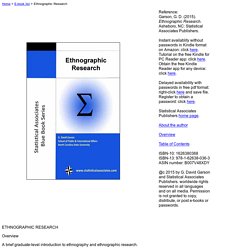
The new 2015 edition features ... Fifty percent more coverage than the 2013 edition. Extensive new section on data gathering strategies. Related information is contained in the Statistical Associates "blue book" volumes on "Grounded Theory," "Nattative Analysis" and "Case Study Research". The full content is now available from Statistical Associates Publishers. Below is the unformatted table of contents. NPS Ethnography: African American Heritage & Ethnography. Anthropologists, ethnographers, and other social scientists may engage in something called ethnography.
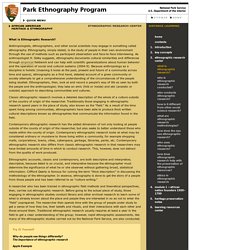
Ethnography, simply stated, is the study of people in their own environment through the use of methods such as participant observation and face-to-face interviewing. As anthropologist H. Genzuk: A Synthesis of Ethnographic Research. Center for Multilingual, Multicultural Research University of Southern California Re-printed with permission.
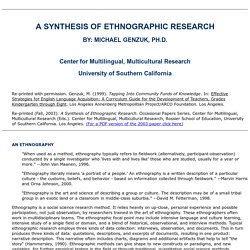
Genzuk, M. (1999). Tapping Into Community Funds of Knowledge. In: Effective Strategies for English Language Acquisition: A Curriculum Guide for the Development of Teachers, Grades Kindergarten through Eight. The ethnographic case study approach Case study research is used when the research topic has to be defined broadly, the research needs to cover several variables and not just isolated ones, or the research has to rely on multiple sources of evidence.
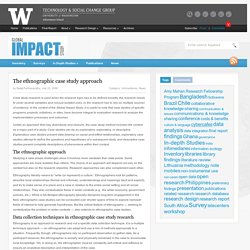
In the context of the Global Impact Study, it is useful to note that case studies of specific programs, projects, initiatives, or sites, have become integral to evaluation research to analyze the implementation processes and outcomes. Unlike an approach that may disembody and obscure, the case study method includes the context as a major part of a study. Case studies can be as explanatory, exploratory, or descriptive. Ethnographic research — Government Service Design Manual. Ethnographic research usually involves observing target users in their natural, real-world setting, rather than in the artificial environment of a lab or focus group.
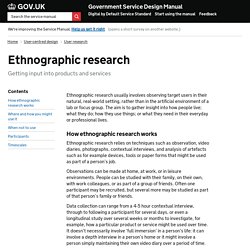
The aim is to gather insight into how people live; what they do; how they use things; or what they need in their everyday or professional lives. How ethnographic research works Ethnographic research relies on techniques such as observation, video diaries, photographs, contextual interviews, and analysis of artefacts such as for example devices, tools or paper forms that might be used as part of a person’s job. Observations can be made at home, at work, or in leisure environments. People can be studied with their family, on their own, with work colleagues, or as part of a group of friends.
ERIAL Project. Sangasubana. What Is Ethnographic Research Marketing? Pr apx b ethnographic. Making the Most of Ethnographic Research. Even the most seasoned researchers can't always get people to articulate their unmet needs.
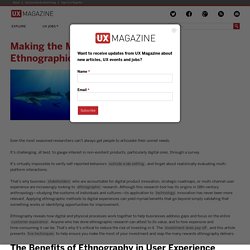
It's challenging, at best, to gauge interest in non-existent products, particularly digital ones, through a survey. It's virtually impossible to verify self-reported behaviors outside a lab setting, and forget about realistically evaluating multi-platform interactions. That's why business stakeholders who are accountable for digital product innovation, strategic roadmaps, or multi-channel user experience are increasingly looking to ethnographic research.
Although this research tool has its origins in 18th century anthropology—studying the customs of individuals and cultures—its application to technology innovation has never been more relevant. Applying ethnographic methods to digital experiences can yield myriad benefits that go beyond simply validating that something works or identifying opportunities for improvement. LeCompte Goetz Problems of Reliability Validity in Ed Re. Center for Ethnographic Research - CER. Ethnographic Research in Medical Sociology. Its Foci and Distinctive Contributions Abstract Medical sociology ranges from studies of formal medical care to those of health, healing, and caring practices outside the health care system.
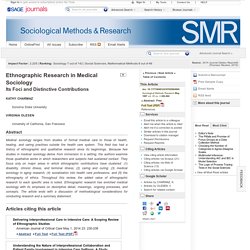
The Institute for Ethnographic Research. The Institute for Ethnographic Research (IFER) is a part of the George Washington University, housed in the Department of Anthropology, but includes scholars from other institutions. Its mission is to provide support and resources for scholars and researchers working together on intellectual, ethical, and practical issues in ethnographic theory and method. Chartered in February, 2001, IFER is a center for collaborative research and teaching and for the publication of anthropological scholarship.
It publishes Anthropological Quarterly ("AQ"), a leading refereed journal of sociocultural anthropology. It was founded in 1928 by the Catholic University of America with the title Primitive Man and acquired by IFER in September, 2001. The journal helps IFER become known as a research center, as a place that can set new research agendas for scholars working throughout the world. However, as an "institute" as opposed to a "center," members include researchers outside GW: Jon W. Ethnographic And Field Study. Ethnographic and Field Study Techniques Audience. Initiating Ethnographic Research: A Mixed Methods Approach - Amazon.com. Training in Qualitative and Quantitative Social Research Methods. Apply now through March 1 for the 2016 course. Course Overview. GET: Mini-Ethnographies. Further to Adam’s post on writing suggestions for the GET mini-ethnographies here are some more detailed guidelines.
At its most simplistic, an ethnography (noun version) is a written account of a culture based on first hand interaction. It is an attempt to both understand and give an account of another culture from the “native’s” point of view—that is from the view of the person living in that culture. Ethnographies tend to cover all aspects of a culture from traditions, to family, to religion, etc. For this paper you are going to write a “mini” ethnography. You are expected to use the information you gained through first-hand interaction with your partner(s) and their classmates to write a short ethnographic account about a particular aspect of your partner’s culture.
For this paper, you should explore the topic of your choice in depth. The paper will be no longer than 3 (double-spaced) pages. McDonald%20Observation%20 %20Valeria%20Baiamonte. Mini Ethnography Research Project : Course Outline. Mini-ethnography: Meaningful exploration made easy. 601Vol. 32, No. 9 1 hour reviewing the audiotape to recall information and quotations supporting the themes. The most in- teresting themes were listed and compared, and areas for further dis- cussion were developed. Limited participant observation occurred during a hospital-based lactation clinic. Provided a venue for the student to discuss data and progress with the preceptor; at the end, the student gave a lunchtime presentation to interested clinic personnel. "A mini-ethnographic study to explore the daily experiences of school r" by Jordan E Grossman. Ethnographic Practices: From ‘Writing-up Ethnographic Research’ To ‘Writing Ethnography’ Quality of practice in an intensive care unit (ICU): a mini-ethnographic case study.